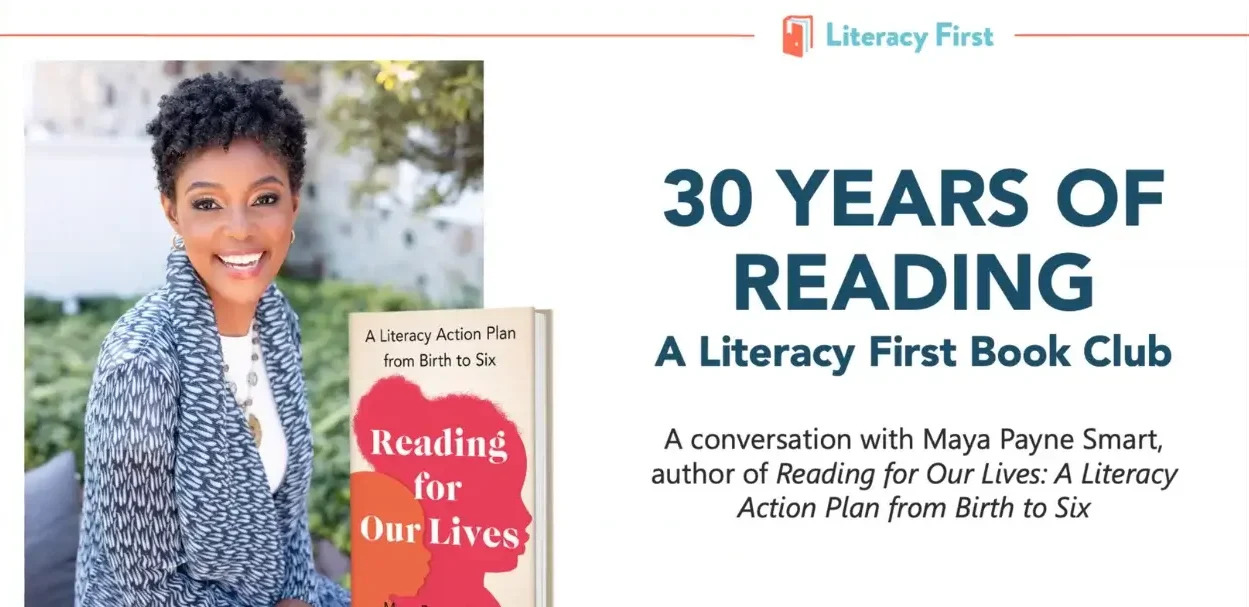Literacy First, an Austin-based high-impact tutoring program, kicked off its 30th anniversary celebrations in a meaningful way: with a virtual book club discussion of my book, Reading for Our Lives.
Rather than just retrospective fanfare, the organization chose to ponder its mission by engaging staff, board members, district partners, and the broader community in a thoughtful dialogue about work outside of its current scope. The topic: engaging with parents of kids before they arrive in school. This choice underscores Literacy First’s commitment to continuous learning and using collaboration to drive change.
Reading for Our Lives Book Discussion
It was a pleasure to join the conversation with readers who had already engaged with the book. Their questions showed real curiosity and thought, diving into the nuances of my writing process: Why that title? How did I decide which histories and voices to feature? We also explored practical strategies for supporting young readers—tools that anyone, whether a parent, teacher, or community member, could use.
The discussion took on some of today’s most pressing literacy topics, including how to embrace multilingualism as an asset to literacy development. Another topic we addressed was the role organizations like Literacy First, along with partners such as BookSpring and school districts, can play in achieving literacy for all children.
Participants were eager to dig into early literacy milestones, reflecting on the need for schools to raise expectations around specific literacy skills like phonemic awareness and decoding. A recurring theme emerged: the challenge of communicating to parents and educators that just good enough isn’t good enough—early literacy skills matter deeply, and they set the foundation for future success.
We also tackled practical concerns. How can preschools recognize the importance of systematic instruction? What strategies work for families with neurodiverse children or late talkers who aren’t ready to jump into conversations but still want to build literacy skills? And finally, I was asked a fun yet intriguing question: Have you thought about starting a podcast? (My answer: Try me in 2026!)
Literacy First: The Gold Standard of Reading Tutors
For three decades, Literacy First has set the bar for reading intervention through its effective approach, inclusivity, and measurable impact. Serving students from kindergarten through second grade in both English and Spanish, the program will support 2,000 children this year—adding to the more than 30,000 students it has helped since its founding.
I’ve followed Literacy First since 2017, and I can attest that it’s the real deal. During my time in Austin, I had the opportunity to observe its tutor training sessions, attend a tutor swearing-in ceremony, visit schools to see tutors in action, and celebrate the program’s successes. Making it possible for well-trained tutors to intensively support kids’s reading development in English or Spanish for 30 minutes a day 5 days a week is as impactful as it is rare.
Two key lessons stood out during my Literacy First observations. First, focus and intensity matter. To be effective, educators need to engage with research, identify the exact skills students need, and deliver targeted instruction at a dosage high enough to move the needle. Second, tracking progress is essential. Literacy First not only holds itself accountable to results, but it also makes sure its efforts translate into measurable improvements for students.
A Reading Mission That Matters
I’ve seen firsthand how transformative qualified tutors can be. There’s simply no substitute for a focused, intentional effort to teach more people how to teach reading. Sadly, in too many settings, reading tutoring falls short—not due to lack of effort, but because of a lack of expertise and funding.
Children deserve better. They need programs like Literacy First that combine research-backed methods with a commitment to excellence and accountability.
After 30 years of remarkable impact, Literacy First remains a beacon of hope for students, families, and educators. Despite its age, I think it’s just getting started.
Get Reading for Our Lives: A Literacy Action Plan from Birth to Six
Learn how to foster your child’s pre-reading and reading skills easily, affordably, and playfully in the time you’re already spending together.
Get Reading for Our Lives

